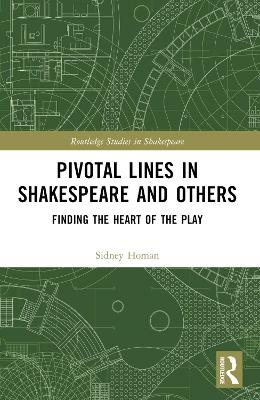
Pivotal Lines in Shakespeare and Others
Routledge (Verlag)
978-1-032-34864-3 (ISBN)
- Lieferbar (Termin unbekannt)
- Versandkostenfrei innerhalb Deutschlands
- Auch auf Rechnung
- Verfügbarkeit in der Filiale vor Ort prüfen
- Artikel merken
Sidney Homan defines a pivotal line as “a moment in the script that serves as a pathway into the larger play … a magnet to which the rest of the play, scenes before and after, adheres.” He offers his personal choices of such lines in five plays by Shakespeare and works by Beckett, Brecht, Pinter, Shepard, and Stoppard. Drawing on his own experience in the theatre as actor and director and on campus as a teacher and scholar, he pairs a Shakespearean play with one by a modern playwright as mirrors for each other. One reviewer calls his approach “ground-breaking.” Another observes that his “experience with the particular plays he has chosen is invaluable” since it allows us to find “a wedge into such iconic texts.” Academics and students alike will find this volume particularly useful in aiding their own discovery of a pivotal line or moment in the experience of reading about, watching, or performing in a play.
Sidney Homan is Professor of English at the University of Florida. Author of 13 books and editor of nine collections of essays on the works of Shakespeare and modern playwrights, he is also an actor and director in commercial and university theatres. His prize-winning Beckett’s Theatres: Interpretations for Performance emerged from a tour of the Florida prisons with Waiting for Godot; and in A Fish in the Moonlight, he recounts his experience as a Visiting Artist telling stories of his youth in Philly to young patients on his university hospital’s Pediatric Oncology Ward. Chosen as his university’s Teacher/Scholar of the Year, he is also a member of the Academy of Distinguished Teaching Scholars.
Introduction
Chapter 1: Hamlet: "Who’s there?"
Chapter 2: Stoppard, Rosencrantz and Guildenstern Are Dead: "Where we went wrong was
getting on a boat."
Chapter 3: The Taming of the Shrew: "Kate: Where did you study all this goodly speech?
Petruchio: It is extempore, from my mother wit."
Chapter 4: Pinter, Old Times: "No, I’ll run it myself tonight."
Chapter 5: A Midsummer Night’s Dream: "And grows to something of great constancy."
Chapter 6: Shepard, True West: "So, they take off after each other straight into an endless
black prairie."
Chapter 7: The Comedy of Errors: "And here we wander in illusions." and "I’ll Entertain the
Offered Fallacy."
Chapter 8: Beckett, Waiting for Godot: "Tell him … [he hesitates] … tell him you saw me and
that … [he hesitates] … that you saw me."
Chapter 9: Brecht and Weill, The Threepenny Opera: "Reprieved"
Chapter 10: King Lear: "Do you see this? Look on her! Look, her lips."
Conclusions: A Manual for Pivotal Lines and the Audience
| Erscheinungsdatum | 17.05.2023 |
|---|---|
| Reihe/Serie | Routledge Studies in Shakespeare |
| Verlagsort | London |
| Sprache | englisch |
| Maße | 152 x 229 mm |
| Themenwelt | Literatur ► Lyrik / Dramatik ► Dramatik / Theater |
| Geisteswissenschaften ► Sprach- / Literaturwissenschaft ► Anglistik / Amerikanistik | |
| Geisteswissenschaften ► Sprach- / Literaturwissenschaft ► Literaturwissenschaft | |
| ISBN-10 | 1-032-34864-X / 103234864X |
| ISBN-13 | 978-1-032-34864-3 / 9781032348643 |
| Zustand | Neuware |
| Haben Sie eine Frage zum Produkt? |
aus dem Bereich


